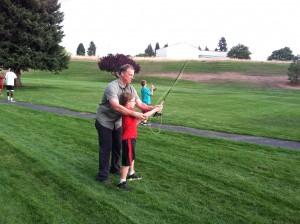By Spokane Riverkeeper Jerry White
After-school fly fishing & river education camps have finished up at the West Valley Outdoor Learning Center. These camps happened because of a successful partnership between Hutton Settlement, Inland Northwest Nature Connection, Spokane Riverkeeper , Spokane Valleyfest and Spokane Valley Parks and Recreation. Additionally, the Spokane River Forum helped us organize the service portion of the project. Over the course of a week, the students from Hutton settlement learned a bit about river ecology, macro-invertebrates, native trout and invasive species. They learned how to tie flies, they participated in the Upriver Scrub picking up garbage along the river, and finally caught some fine hatchery trout from the Mirabeau Parkway pond. These rainbow trout were left in the pond after the kids fishing day during Valleyfest. The camp kids helped ensure that these trout would not die during the winter, but be caught, cleaned and eaten for dinner by the kids of Hutton. Thanks to all for a great experience!
Help us continue our work in the community! Please consider purchasing a Spokane Riverkeeper T-shirt for $25. High quality, Alternative Apparel brand, available in 3 colors- Adult sizes only. For each purchase made, Ammonite Ink will donate $11.20 to Spokane Riverkeeper!


